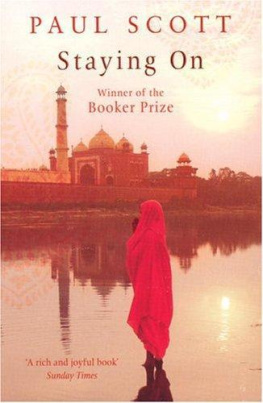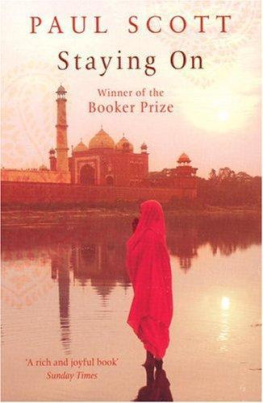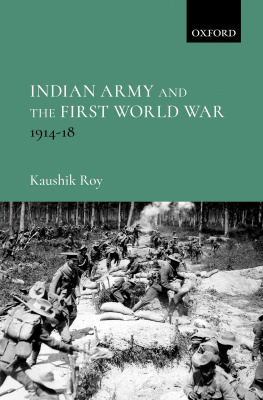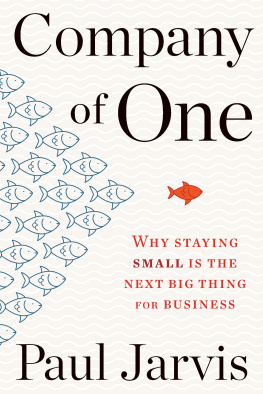Paul Scott - Staying on: a novel
Here you can read online Paul Scott - Staying on: a novel full text of the book (entire story) in english for free. Download pdf and epub, get meaning, cover and reviews about this ebook. City: Chicago, India, India, year: 2009, publisher: Univ. of Chicago Press;Arrow, genre: Detective and thriller. Description of the work, (preface) as well as reviews are available. Best literature library LitArk.com created for fans of good reading and offers a wide selection of genres:
Romance novel
Science fiction
Adventure
Detective
Science
History
Home and family
Prose
Art
Politics
Computer
Non-fiction
Religion
Business
Children
Humor
Choose a favorite category and find really read worthwhile books. Enjoy immersion in the world of imagination, feel the emotions of the characters or learn something new for yourself, make an fascinating discovery.
- Book:Staying on: a novel
- Author:
- Publisher:Univ. of Chicago Press;Arrow
- Genre:
- Year:2009
- City:Chicago, India, India
- Rating:3 / 5
- Favourites:Add to favourites
- Your mark:
- 60
- 1
- 2
- 3
- 4
- 5
Staying on: a novel: summary, description and annotation
We offer to read an annotation, description, summary or preface (depends on what the author of the book "Staying on: a novel" wrote himself). If you haven't found the necessary information about the book — write in the comments, we will try to find it.
Instead of returning home when he retired, Tusker, once a Colonel in the British Army, and his wife Lily chose to remain in the small hill town of Pangkot with its eccentric inhabitants and archaic rituals left over from the days of the Empire.
From the Publisher7 1.5-hour cassettes
Staying on: a novel — read online for free the complete book (whole text) full work
Below is the text of the book, divided by pages. System saving the place of the last page read, allows you to conveniently read the book "Staying on: a novel" online for free, without having to search again every time where you left off. Put a bookmark, and you can go to the page where you finished reading at any time.
Font size:
Interval:
Bookmark:
| Staying On |
| Paul Scott |
| Arrow (1984) |
| Rating: |
Product Description
Instead of returning home when he retired, Tusker, once a Colonel in the British Army, and his wife Lily chose to remain in the small hill town of Pangkot with its eccentric inhabitants and archaic rituals left over from the days of the Empire.
From the Publisher
7 1.5-hour cassettes
STAYING ON
by Paul Scott
a novel
THE UNIVERSITY OF CHICAGO PRESS
To my old colleague and friend
Roland Gant
whom I regard and thank
Grateful acknowledgment is made to Bourne Company for permission to quote from the lyrics of These Foolish Things, Copyright 1935 by Boosey and Co. Ltd., Copyright renewed, rights for the United States of America and Canada assigned to Bourne Co. New York, New York 10036; and to Mrs. Sally Simpson for permission to quote from the lyrics of Chloe, Copyright-Villa Moret, Inc.
The University of Chicago Press, Chicago 60637 Copyright 1977 by Paul Scott
All rights reserved. Originally published 1977 University of Chicago Press Edition 1998
Printed in the United States of America.
04 03 02 01 00 99 98 654321
Library of Congress Cataloging-in-Publication Data
Scott, Paul, 1920-78
Staying on : a novel / Paul Scott. University of Chicago Press ed. p. cm.
ISBN 0-226-74349-7 (acid-free paper) 1. BritishIndiaHistory20th centuryFiction. 2. IndiaHistory1947-Fiction. I. Title. PR6069.C596S73 1998
823.914dc21 98-8059
CIP
The paper used in this publication meets the minimum requirements of the American National Standard for Information SciencesPermanence of Paper for Printed Library Materials, ANSI Z39.48-1992.
STAYING ON
Chapter One
WHEN TUSKER SMALLEY died of a massive coronary at approximately 9.30 a.m. on the last Monday in April, 1972, his wife Lucy was out, having her white hair blue-rinsed and set in the Seraglio Room on the ground floor of Pankots new five-storey glass and concrete hotel, The Shiraz.
The Shiraz was only a step or two away from the little hill stations older hotel, Smiths, whose annexe had been occupied by Tusker and Lucy for ten years. The annexe, known as The Lodge, was a small bungalow in what had once been an adjacent but separate compound, a section of whose dividing wall had been knocked down and a path trodden to create an illusion of connexion between hotel and annexe. The old gateway into The Lodges compound, now known as the side-entrance, gave on to a lane. Immediately opposite was The Shiraz.
If Tusker had been found at once, then, and a message sent across, Lucy would have had the news at just the moment any woman would subsequently have to think of as the most inconvenient at which to hear she had become a widow. At 9.30 she was going under the dryer.
But Tusker lay dead for half-an-hour and might have lain longer if Mrs Bhoolabhoy, who owned Smiths and lived in one of its principal rooms, hadnt become unnerved by the howling of Colonel and Mrs Smalleys dog, Bloxsaw. The howling was not very loud because the dog was locked in Colonel Smalleys garage, but it was persistent so Mr Bhoolabhoy was ordered over to complain on Mrs Bhoolabhoys behalf.
Mrs Bhoolabhoy, who had jowls and favoured sarees in pastel colours such as salmon pink which emphasized the fairness of her skin, was a martyr to several things, among them, migraine. On mornings when she kept to her room, work at Smiths Hotel came virtually to a standstill. The slightest percussive sound was more than she was prepared to bear. The hotel was hers, Mr Bhoolabhoy merely its manager, whom she had married. Mrs Bhoolabhoy weighed sixteen stone. Her husband was constructed on more meagre lines. Mr Bhoolabhoy had managed Smiths for years before the woman he married turned up as its new proprietor. He was her third and youngest husband; according to Tusker Smalley probably the lucky one because she was unlikely to enjoy a fourth, being now almost as richly endowed with killing flesh as with life-enhancing rupees. Tusker, who called Mr Bhoolabhoy Billy-Boy, except when they had quarrelled, which sometimes they had to, said Billy-Boy looked like a man who, inured to disappointment, had suddenly glimpsed an immense possibility and begun to organize himself so as not to make the mistake that would block his way to it. Mrs Bhoolabhoy had had no children by any of her husbands. He stands to gain, Tusker had often pointed out to Lucy. And he feeds her up a treat. One day shell drop.
Actually, Mrs Bhoolabhoy fed herself without either Mr Bhoolabhoys help or hindrance. His policy was to minimize every risk of incurring her displeasure. These risks were many. On her good days when she waddled about looking into this and that and finding fault he followed in her galleon-wake in his neat well-pressed suit making sure her orders were carried out and the sources of her irritation at once put a stop to. On her bad days he walked on tiptoe and had the entire staff doing the same so that even the guests (when there were any) felt themselves under a cloud and got out of the place as soon as possible after breakfast.
The last Monday morning in this April (April 24) was such a morning; if anything heavier than usual with the pressure of Mrs Bhoolabhoys martyrdom which throbbed like a silent fog-warning through the hotel from the shuttered bedroom (the old Number One) where she lay on a massive double bed which she took up most of. Occasionally Mr Bhoolabhoy was detailed to share this bed but had not been the previous night when he had slept in his own room (the old Number Two). The two rooms were en-suite with a communicating door which Mr Bhoolabhoy never bolted his side of but which frequently did not give to his gentle midnight nudge. He had not nudged it the night before. Sunday had been a shattering day.
At 7.30 a.m. he was summoned from No. 2 to No. 1 by his wifes personal maid, a local Pankot woman whom they called by the name she had been given long ago by the British military family who employed her as a little ayah until they went home in 1947: Minnie. Minnie was now plump, middle-aged and grumpy. Mr Bhoolabhoy got no change out of her. She took orders only from Mrs Bhoolabhoy, and not always from her. Mr Bhoolabhoy maintained a cautious attitude to Minnie. Sometimes Minnie complained about him to Mrs Bhoolabhoy, or about what she called Management which came to the same thing. This led to Mrs Bhoolabhoy shouting at him. At other times when Minnie was being uncooperative even with Mrs Bhoolabhoy he got shouted at again.
You cant win, old man, Tusker had told him. Not with women. Minnie probably fancies you. It gives her a kick to get you into trouble. Obviously youve never made a pass at her. Try it.
No, no. It must be menopause.
In that case she ought to go into the next Guinness Book of Records. Youve been saying that for years. Have another peg.
So they had had another peg. That was a week ago. Monday evenings were evenings Mr Bhoolabhoy usually looked forward to. However badly Monday started, however badly indisposed Mrs Bhoolabhoy was at breakfast-time, by lunch she had usually recovered sufficiently to take some nourishment and so fortify herself to spend the rest of the gruelling day playing bridge at the Pankot Gymkhana Club. Mondays were not her only bridge days: there could be sessions on Tuesday, Wednesday, Thursday, Friday and Saturday; but never Sunday because Sunday was Mr Bhoolabhoys day off and her day for checking his records of the hotels income and expenditure which often contributed to the fact that there could easily be a difference of opinion between them on Sunday evening, a celibate night for Mr Bhoolabhoy and a Monday morning migraine for his wife.
What gave Monday evenings their attraction was not just that Mrs Bhoolabhoy could be counted on to stay late at the club but also that on these evenings Mrs Smalley took herself to the pictures at the New Electric. Once Mr Bhoolabhoy had seen the last evening guest out of Smiths dining-room and ensured that the servants were beginning to clear up and the kitchen-staff to wash up, that cook had remembered to prepare Mrs Bhoolabhoys midnight snack, that Minnie had properly arranged her mistresss bed and was somewhere within her mistresss immediate call, then he and Tusker could meet over a bottle either at The Lodge or on the verandah of the hotel (where the sound of Mrs Bhoolabhoy returning could be better heard).
Font size:
Interval:
Bookmark:
Similar books «Staying on: a novel»
Look at similar books to Staying on: a novel. We have selected literature similar in name and meaning in the hope of providing readers with more options to find new, interesting, not yet read works.
Discussion, reviews of the book Staying on: a novel and just readers' own opinions. Leave your comments, write what you think about the work, its meaning or the main characters. Specify what exactly you liked and what you didn't like, and why you think so.









